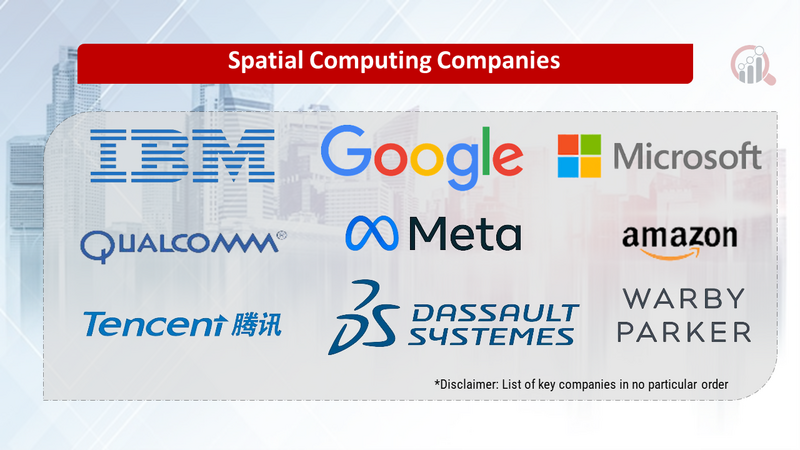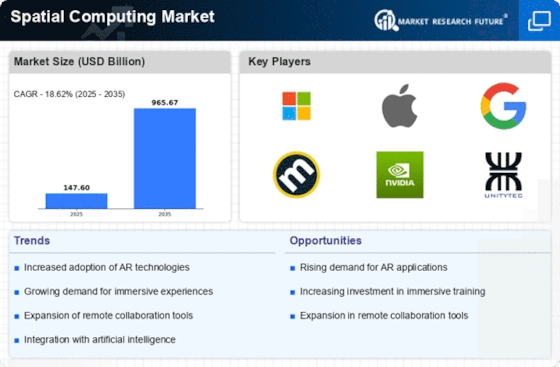Top Industry Leaders in the Spatial Computing Market

Spatial Computing Market: Dive into the Latest News and Updates
Spatial computing, encompassing technologies like augmented reality (AR) and virtual reality (VR), is transforming how we interact with information and the world around us. By overlaying digital elements onto the physical world (AR) or creating immersive virtual environments (VR), spatial computing unlocks exciting possibilities across diverse industries, from healthcare and education to manufacturing and entertainment.
Some of Spatial Computing Companies Listed Below:
- Microsoft Corp
- Facebook (Meta Platforms, Inc.)
- Magic Leap
- Snap Inc
- IBM
- Amazon
- Sphere Partners
- Qualcomm Technologies, Inc
- Varix
- InfiVR
- CitrusBits
- Warby Parker
- Tencent
- Dassult System
Strategies Driving Market Growth:
-
Focus on User Experience: Prioritizing comfort, natural interaction, and high-fidelity visuals ensures user acceptance and broader adoption across diverse use cases. -
Content Diversification and Ecosystem Building: Developing a dynamic content ecosystem with varied applications, from entertainment and education to training and collaboration, enhances market appeal. -
Strategic Partnerships and Collaboration: Fostering partnerships between hardware, software, and content creators accelerates innovation and addresses specific market needs. -
Standardization and Interoperability: Establishing technical standards ensures compatibility between different hardware and software components, driving market growth and user choice.
Factors Influencing Market Share Analysis:
-
Technology Maturity and Cost-Effectiveness: The advancement of display technology, reduction in hardware costs, and improved performance are crucial factors determining market adoption and user affordability. -
Target Audience and Use Cases: Understanding the specific needs of diverse user groups, from corporate collaboration to remote healthcare consultations, is essential for tailoring solutions and achieving market success. -
Network Infrastructure and Bandwidth Requirements: The availability of high-speed, low-latency networks directly impacts the feasibility and scalability of spatial computing solutions. -
Security and Data Privacy Concerns: Implementing robust security measures, ensuring data privacy compliance, and complying with regulations are crucial for gaining user trust and market acceptance.
Emerging Companies and Innovation Trends:
-
Focus on Mobile Spatial Computing: Developing compact, mobile AR/VR displays expands use cases and accessibility, potentially revolutionizing on-the-go interactions and information consumption. -
Integration with Metaverse and Virtual Reality: Bridging the gap between spatial computing and immersive virtual environments opens up new possibilities for collaboration, social interaction, and training experiences. -
Haptic and Multisensory Experiences: Incorporating haptic feedback and other sensory elements creates even more immersive and realistic experiences, enhancing user engagement and effectiveness.
Current Investment Trends:
-
Venture Capital Funding: Innovative startups developing novel display technologies, user-friendly content creation tools, and niche application solutions are attracting significant venture capital funding, fueling market growth and diversification. -
Strategic Investments by Large Players: Established technology companies and industry leaders are investing in promising startups and acquiring niche expertise to strengthen their offerings and gain early market share. -
Government Initiatives and Funding: Governments in some regions are supporting research and development in spatial computing technology, recognizing its potential impact on education, healthcare, and communication infrastructure.
Latest Company Updates:
-
Jan 23, 2024: Qualcomm announces the Snapdragon XR2+ Gen 1 platform, specifically designed for XR devices with improved performance and power efficiency. -
Jan 18, 2024: Nreal announces the Nreal X, a lightweight mixed reality glasses designed for productivity and entertainment. -
Jan 10, 2024: Meta unveils Project Cambria, a high-end mixed reality headset focused on work and collaboration.










